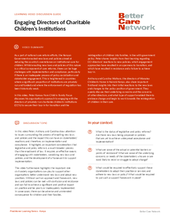As a part of national care reform efforts, the Kenyan Government enacted new laws and policies aimed at reducing the country’s overreliance on institutional care for children. Whilst enacting new laws and policies of this nature is a critical component of care reforms, there can be huge challenges with implementation and compliance, particularly if there is an inadequate process of policy socialization and stakeholder engagement. This is heightened in countries where a significant proportion of institutions are privately run and funded and where the enforcement of regulation has been historically weak.
In this video, Peter Kamau from Child in Family Focus discusses his organisation’s approach to engaging with the directors of privately-run charitable children’s institutions (CCI’s) to secure their buy-in for transition and the reintegration of children into families, in line with government policy. Peter shares insights from their learning regarding CCI directors’ reactions to new policies, which engagement approaches have resulted in an openness to transition, and which have resulted in resistance and a failure to achieve buy-in.
Anthony and Carolina Waiharo, the directors of Wanalea Children’s Home in Nairobi Kenya, also share important firsthand insights into their initial reactions to the new laws and changes to the policy position of government. They openly discuss their underlying concerns and the concerns of other directors, and what type of support enabled them to embrace change and begin to work towards the reintegration of children in their care.
This video is part of a series of practitioner learning videos from Kenya.
For more practitioner learning videos, watch our Cambodia and Uganda series.

